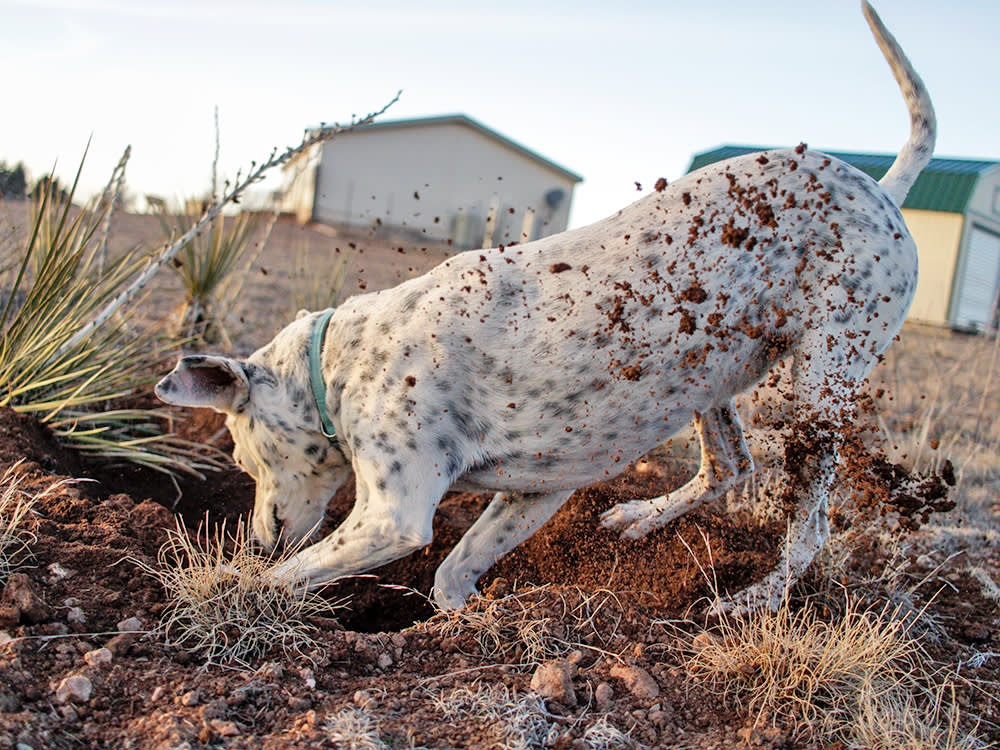How To Tell If Your Dog Has Worms
Look out for these very specific signs.

Share Article
In This Article:
Does My Dog Have Worms? How To Tell If My Dog Has Worms Does My Dog Have Heartworms? Symptoms of Dogs with Intestinal Worms
Sometimes it’s very obvious when a dog has worms, like when you see the actual worms in their poop, but other times, a dog can have little to no signs when they have a parasite living rent free in their body. This is because parasites have evolved to remain undetected in order to take advantage of their host.
There are many different types of worm-like parasites and they each have their own unique lifecycle, parts of the body they like to invade, and possible symptoms they can cause. While many parasites cause only mild discomfort, others, like heartworms, can be life-threatening. Preventative care, including routine deworming and yearly screenings, are a crucial part of keeping your dog healthy and identifying infections before they become serious.
Read on to learn more about different types of worms in dogs.

Does my dog have worms?
It sounds like a scene straight out of a sci-fi movie, but the most obvious way to find out your dog has worms is if you see the actual worms in their poop or vomit. And you certainly won’t get that image out of your head for a while. Some worms are extremely common and cause little to no signs, so you may not know that your dog is infected.
Other kinds of worms cause more severe signs so you’ll know right away that something is up, but you may not know exactly what is causing their illness. For example, intestinal parasites like whipworms and hookworms cause signs including diarrhea and weight loss while heartworms can cause breathing problems in the advanced stages. The good news is that most parasite infections can be easily treated with the proper medications. Be sure to see your vet any time you suspect your dog has worms or any changes in their health or behavior.
What kind of worms does my dog have?
Depending on where you live in the world, different parasites may be more or less common for dogs. Your dog’s lifestyle will also influence what kinds of parasites they are likely to encounter. Dogs that spend more time outdoors, catching rodents, or eating random things in the woods are more likely to pick up certain parasites. Dogs who hang out with lots of other dogs, such as in doggie daycare or going on group walks may also be more likely to pick up worms.
Most of the time, you won’t be able to determine what kind of worms your dog has based on their symptoms alone. You may be able to figure it out if you see an actual worm and can identify its appearance, but the best way to know for sure if your dog has worms and what type of worms they have will be to see your vet for specific screening tests.
For intestinal parasites, this typically involves providing your vet with a poop sample that they can test for parasites. Some of these tests examine the poop microscopically for parasite eggs, which are often shed into the poop even when no worms are visible. The most common intestinal worms in dogs include roundworms, tapeworms, hookworms, and whipworms. Other kinds of parasites, like heartworm, can be detected from a blood test.
In the early stages of a heartworm infection, dogs will have no signs at all, but this is the most critical point to treat them and clear the infection. As these infections become more advanced, dogs may have more signs of illness and treating them also becomes more complicated and risky. Therefore, relying on your dog’s symptoms to know if they have worms is not the best approach. It is ideal to screen them routinely and treat these infections before symptoms even begin.
In many cases, you’ll find out your dog has worms during their routine health screenings since they won’t have any signs of illness at all. Other times, your dog may develop signs of illness if they pick the kind of infection that tends to cause more symptoms. Some of these signs include:
Visible worms in the stool or vomit: This is the classic sign of intestinal parasites. If you see a worm in your dog’s poop or vomit, it is important to see a vet right away to get them treated because there’s definitely more where that came from.
Vomiting: Some parasites attach to the intestines, causing inflammation within the digestive tract, and leading to signs like vomiting or changes in appetite.
Diarrhea: Other parasites tend to reside in the large intestines, or colon. This can cause inflammation and interfere with water absorption in the colon, leading to diarrhea, gas, and discomfort.
Sudden weight loss: Intestinal parasites thrive by absorbing nutrients directly from the digestive tract, bogarting them from your pup. As a result, dogs with severe parasite infections may develop nutritional deficiencies and lose weight. The ongoing inflammation of the digestive tract along with diarrhea or decreased appetite can also contribute to weight loss.
Failure to gain weight: Parasites can also interfere with weight gain even when dogs seem to have a good appetite and are eating a lot. This is because they are absorbing important nutrients that your pup needs to grow.
Dry or dull coat: This may be another result of poor nutrition as your dog loses important vitamins and minerals to its parasitic invaders.
Bloated or pot bellied appearance: Intestinal parasites damage the digestive tract, interfering with normal digestion, and resulting in excess gas and fluid within the digestive tract. This can lead to a bloated or pot bellied appearance.
Scooting or licking their hind end: Some parasites, like tapeworms, also cause irritation around the anus. This can make dogs feel itchy or uncomfortable and lead them to scoot or lick their butts.
Weakness or lethargy: All parasites are unwelcomed invaders that steal nutrients from your dog. Over time, this can lead to weakness and lethargy as a result of nutritional deficiencies and interference with their body’s normal functions. Parasites like heartworm can also cause more advanced lethargy and difficult breathing as they invade important structures in the heart and lungs.
Does my dog have heartworm?
Heartworm is a whole different can of worms, excuse the pun. Unlike intestinal parasites, heartworms reside within the heart and lungs, not the digestive tract. Therefore, they do not cause any digestive upset, diarrhea, or vomiting. Heartworms are transmitted by mosquitoes so depending where you live and how prevalent mosquitos are, heartworm may be a year-round concern.
In the early stages of heartworm disease, there are no symptoms and the worms are in an immature stage of development. At this stage, they can be easily killed with appropriate medications. As the worms mature, they migrate to the heart and lungs. As these worms grow and multiply, they can cause serious complications including blocking crucial blood vessels, leading to serious heart and lung problems, and even death. Signs at this stage include difficulty breathing, lethargy, or coughing.
Getting rid of the large adult worms is also much more challenging because they can cause intense inflammation and block important vessels even if they are killed. If you live in an area where mosquitoes and heartworm are a risk at any point during the year, it is important to stay on top of monthly prevention and routine screenings.
Symptoms of intestinal worms in dogs
Intestinal parasites are fairly common in dogs and can cause a range of signs. For many dogs, there are no signs at all, especially if they have a mild infection. Younger puppies and dogs with weakened immune systems are most likely to show more serious signs; they have more trouble fighting off these infections. The signs will also vary depending on the specific type of parasite causing the infection.
Common intestinal parasites, like roundworms, often cause little to no signs while other worms including hookworms and whipworms tend to cause more serious signs of illness. In general, intestinal parasites interfere with normal digestion and cause signs like vomiting, diarrhea, changes in appetite, and lethargy. With more serious infections, dogs may lose weight, become anemic, have blood in their poop, or suffer from nutritional deficiencies. Any dog showing these signs should see a vet right away. While many of these signs can occur with other conditions as well, they are all signs of a medical problem that needs prompt treatment.
When to seek expert help
Keeping your dog safe from parasites requires both routine veterinary care and seeking help whenever your pup seems unwell. The best way to prevent parasites and catch infections early is through routine exams and screenings with a vet every six to 12 months. This is one of the best things you can do to protect your pup. The other is to seek veterinary care whenever your dog is sick.
Whether your pup has a few days of mild diarrhea or more serious signs, it is important to get them treated appropriately to avoid complications later. And certainly, any time your dog has severe signs of illness, it is best to get them to a vet immediately, even if that means finding an emergency clinic open in the middle of the night or on a holiday. The sooner you can get an accurate diagnosis and start the proper treatment, the sooner your pup will feel their best again.
Bottom line
There are many different kinds of worms that can infect dogs and cause illness.
In most cases you will not be able to determine what kind of worms your dog has without testing performed by a veterinarian.
Routine parasite screenings and preventive dewormings are the most effective ways to prevent and treat early infections before they can cause serious complications.
References
Bowman, D, et al. “Parasite Protocols: Canine Intestinal Helminths.opens in new tab” Today’s Veterinary Practice, January/February 2014.
Heartworm Basicsopens in new tab. American Heartworm Society, Accessed May 2025.
Paul, M. “Parasite Control in Pets Requires Year-Round Vigilanceopens in new tab.” Companion Animal Parasite Council, Accessed May 2025.

Dr. Amy Fox, DVM
Amy Fox, DVM is a small animal veterinarian in New York City with over thirteen years of experience in a mixture of general practice, emergency medicine, and shelter medicine. A lifelong animal lover, Dr. Fox studied biology in college and then worked as a veterinary nurse before pursuing veterinary school at Cornell University. Her expertise includes surgery, dentistry, and management of chronic conditions, and she is interested in toxicology, pain management, nutrition, care of senior pets, and educational outreach. Dr. Fox also enjoys writing about veterinary medicine and teaching, and her work has previously appeared in Spruce Pets. In her free time, she loves to cook, garden, go for long runs, and hang out with her goofy mixed-breed dog May, who provides never ending comic relief!
Related articles
![Two dogs digging outside in the dirt.]()
Types of Worms in Dogs: How to Detect and Treat Worms in Dogs
Here are the types of worms your pup could get, how you know they have them in the first place, and how to get rid of them for good.
![A black dog with a tilted head looks attentively at the camera while sitting in grass.]()
Is My Dog’s Poop Normal?
From bloody poop to diarrhea—all your dog’s poop problems explained.
![Adorable dog sitting on a rug next to some boots scooting]()
Scooting After Pooping: Weird Things Dogs Do, Explained
Dog trainer Emma Bowdrey helps explain this common canine behavior.
![One month old brown brindle Jack Russell puppy lies on a woman's lap. She strokes the dog's soft tummy. Mother dog is watching nearby.]()
Puppy Parasites 101: What You Need to Know to Keep Your Pup Safe
Does your pup have a pot belly? Have you noticed something moving in their poop? Yep — it’s time to talk about puppy parasites.
![Woman comforting large black and white dog on the couch.]()
My Dog Has Bloody Diarrhea: What to Do and Home Remedies
And when to visit your veterinarian.
![a pug is cradled by a person in scrubs with a stethoscope]()
Everything You Need to Know About Heartworm
Heartworm disease is as gnarly as it sounds. Here’s how to prevent a horror story from coming true for your pet.








